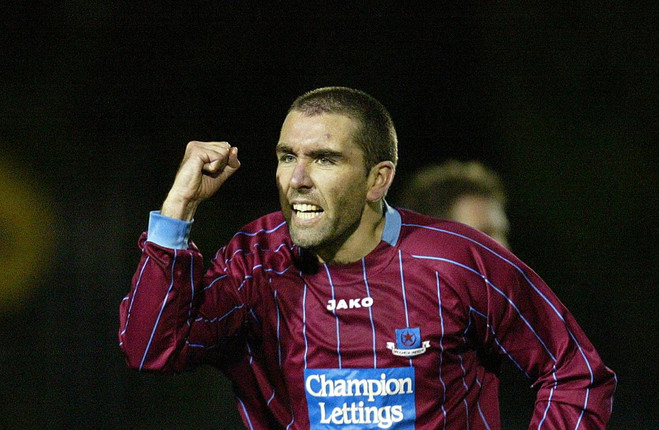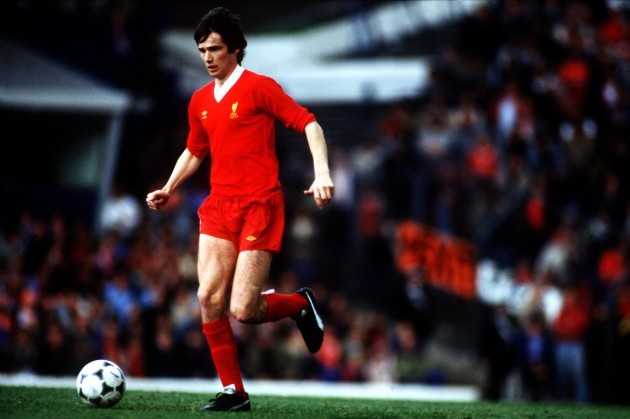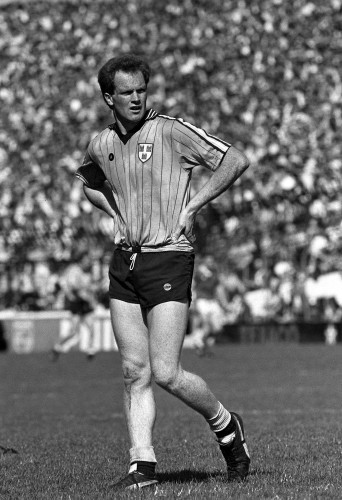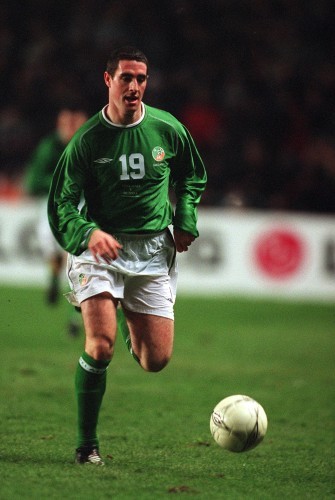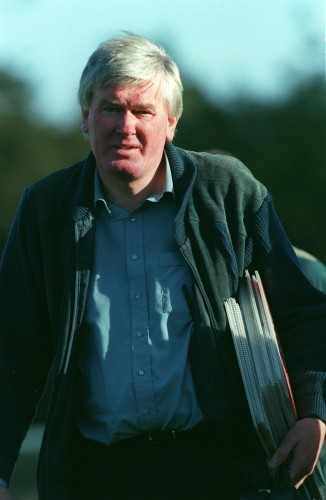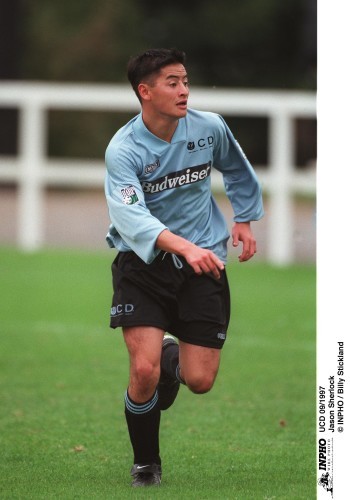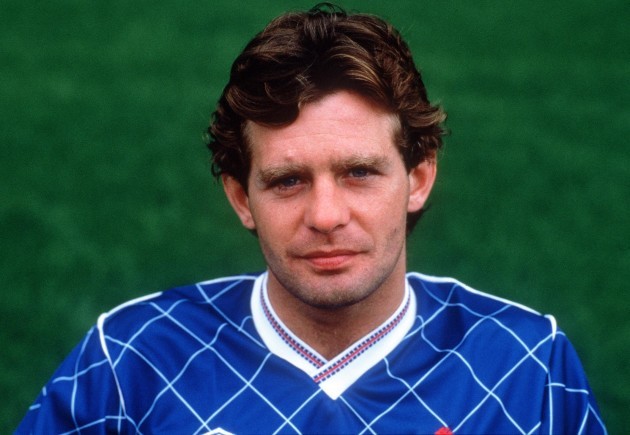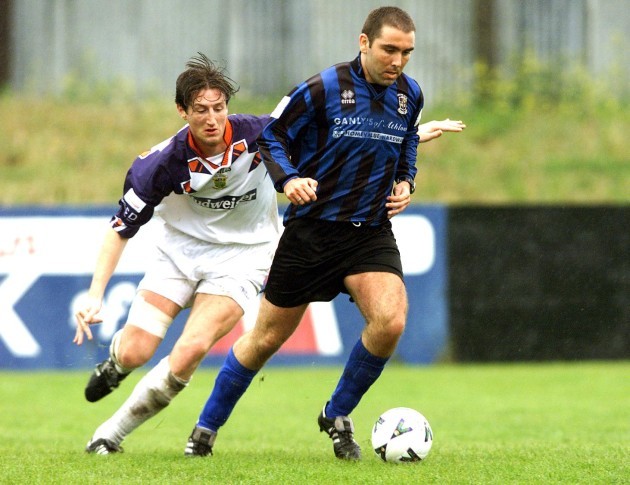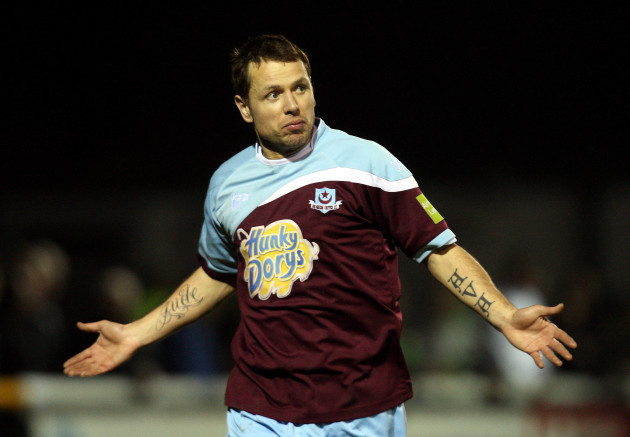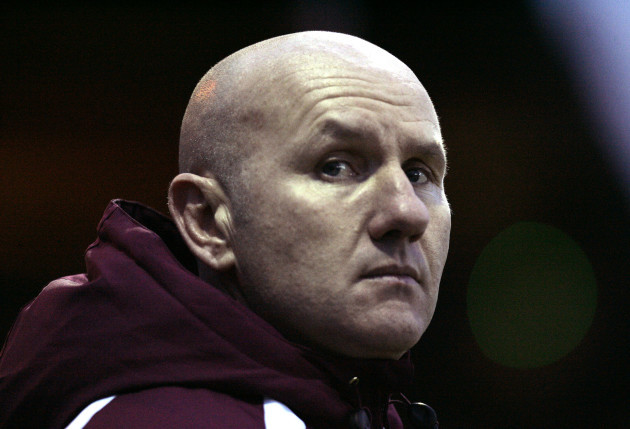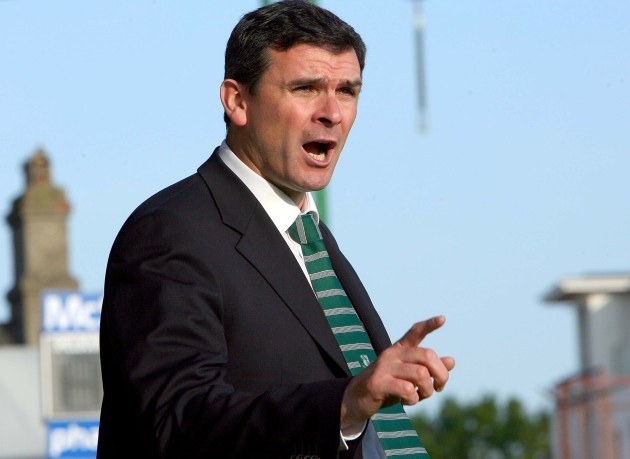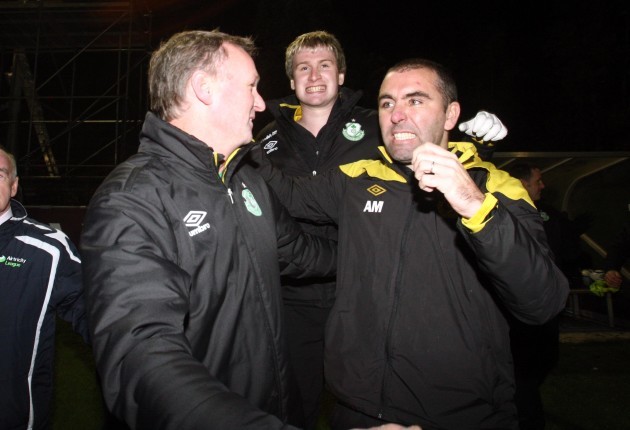THERE IS A dedication bordering on fanaticism generally required to play football at a high level.
Andy Myler may never have lined out in the Premier League, Serie A or La Liga, but he is 17th on the list of all-time League of Ireland top scorers. And what makes the feat all the more impressive is that he achieved it while remaining part-time throughout his entire career.
At the time of his senior debut in 1994, the league was still a number of years away from embracing professionalism and moving to summer football.
To be so prolific in itself is a remarkable achievement. But doing it while holding down a job outside of football makes it especially outstanding.
Consider the discipline required to work five days a week in addition to training and playing games regularly. All that travelling back and forth to work, to training and not mention away venues in places such as Cork or Derry. To adhere to this lifestyle on a consistent basis for nearly 15 years, as Myler did, requires a pure love of football more than anything else.
1. A sporting life
But before the obsession and passion required for this arduous journey came the innocence of a childhood spent immersed in sport.
“I can remember having a number six Alan Hansen Liverpool jersey and gear — that’s my earliest memory of football,” Myler tells The42.
“From that point, the Home Farm mini leagues, organised football, bits and pieces like that.
“Playing Gaelic football, hurling, anything you could get your hands on when you’re eight, nine, 10.
I remember from watching football, my dad was always a massive Rovers fan, a massive sports fan. We would have been out to games in Milltown, Croker or whatever else as well.”
Myler believes a mutual loved of GAA and soccer was beneficial to his career in the latter long term, and is not enthusiastic about the idea of pushing kids towards one particular sport at a young age.
“I think there were studies in the States a while ago that showed guys who played basketball, baseball, American football, it actually stands to them later on in terms of how successful they are in their professional career.
There are elements to soccer and hurling that I actually think help you in all of the other sports. Sometimes on a Gaelic pitch, you’ll do something you’ve been taught in soccer. Likewise in hurling — positioning or whatever it is — that is a little bit left field from people who have been schooled in only one sport.
“Just from a holistic life point of view apart from anything else, I’d encourage anybody to play as much sport as they can, especially when they’re younger. You have to see what your good at and what you can make a living out of, just so you’re a slightly more rounded individual.”
2. Early influences
Myler says his parents were a key influence in helping to cultivate the youngster’s love of sport.
“I’m from a family of eight kids. We all loved sport, liked watching sport — I’ve five sisters, who would be big sports fans as well. Absolutely from the get go, we would have been encouraged to play football. My dad would have been the Gaelic team manager, even though he would have been more of a soccer guy.
“There was never any pressure around it, in terms of I wasn’t a trophy kid where fellas are screaming at you, it would never be like that. But [my parents] would always be in the background, just encouraging you. I think they saw sport as being important as well.
“All the things we know nowadays, social interaction, all the things you get from sport, [my parents] would have seen that as a major part of it. But back in the day, you start showing your age in this stuff, there wasn’t loads to be doing but sport. If you were going to be spending your time [wisely], it might as well have been sport rather than something slightly more destructive.”
The young Myler was also far from the only talented athlete in his family.
“They didn’t play sport at a high level, but I had a brother who played senior club football in Dublin with Parnells.
“The brothers would have played junior soccer and stuff like that. My dad, I’m always told by guys I meet that he was a very good soccer player back in the day. Soccer wasn’t widely played and he was a decent Gaelic player as well.
I’m not sure how much he embellishes that with time, but I even got stopped by a fella in Croker the other Saturday as I was walking up the steps with my dad. He told me ‘you should have seen this fella playing’. So I think he was good enough.”
In addition to being a keen participant, Myler was also an avid watcher of sport, as he spent hours sitting in front of the TV and attending games while dreaming of emulating his idols.
“Rovers, Liverpool and the Dubs would have been the teams you’re looking at. I remember being quite young around the time of Milltown. That would have been the time of Alan Campbell and Liam Buckley playing for Rovers.
“At that stage, Liverpool would have been very much to the forefront. Hansen would have been my favourite player back then and the obvious ones — Kenny Dalglish, Mark Lawrenson, all of those guys, that great team.
“Then the Dubs — Barney Rock, all of those guys, back in the ’80s as well. Brian Mullins, who I work with now in UCD.”
3. GAA v soccer
Ultimately though, Myler was forced to make what seemed a huge decision at the time — dropping either soccer or GAA.
“I remember sitting at home, absolutely bawling my eyes out in the kitchen while I tried to figure out if I should play Gaelic or soccer, because they clashed on a Sunday.
“I was completely torn, because my dad had been the manager of the Gaelic team, but I did prefer soccer, even back then.
“My mam and dad said ‘it doesn’t matter to us, just pick,’ so I eventually chose soccer. I could always get back to Gaelic, just with a slightly different timetable played over the summer.
“I went to a Gaelic school as well — St David’s down in Artane, where they didn’t have soccer, they didn’t allow soccer at the time, so that’s where you got your Gaelic fix.”
But when you’re 10 years old, [choosing between the two] would have been a significant thing. It certainly wasn’t my dad who was guilting me into it. I don’t know where I was feeling [the guilt over picking soccer].”
Despite making his name in senior football as a prolific striker, Myler spent “three or four years” as a goalkeeper for Home Farm at underage level.
“The manager said: ‘What would you think about playing in goal?’ I said ‘no problem’. I remember my da not being too mad on that one. It didn’t really bother me — I just liked playing football. I stuck it out and after 13, I think I actually joined Belvedere for a year.
“[Ex-Ireland international] Mark Kennedy actually joined Belvedere as well as the goalkeeper. I moved outfield and ended up playing a fair portion of the year at centre forward and moving on to St Kevin’s Boys from there. Mark went on to better things than me, but he ended up not playing in goal either. I don’t know what that was about, but Belvo had a way of turning goalkeepers into centre forwards.”
At Kevin’s, Myler played alongside future Dublin GAA star Jason Sherlock, as well as Tony McDonnell, who would go on to make over 300 appearances for UCD. At that level, he would also come up against some notable names, including future Ireland international Gareth Farrelly.
4. Senior breakthrough
Many other talented youngsters, however, failed to progress on to senior level. What was it that made Myler one of the lucky few who carved out a career in the game?
“I think key to it is that little bit of stickability — 15, 16 and 17 year olds can go one way or the other. I played so much football, all of the time, and I think that’s actually what stood to me. If I was chatting to other guys when I was 15 or 16, guys who may have been schoolboy internationals but didn’t end up making it, I think the key part if you summed it all up — if it wasn’t in training or home on the road, or school, I was still playing a heck of a lot of football. It’s the hours more than anything else.
And I didn’t have pushy parents or stuff like that. I had supportive parents and that’s something I noticed when I look back at what I was like as a teenager. Later on, I would have worked in coaching for a couple of years. You come across some parents with their kids when they’re that age — they’re as big an influence as anything else and they can be a bad influence as well as a good influence. That bit of hanging back and being supportive is a better approach and certainly suited me.”
Myler got his break with UCD in 1994, after impressing at Kevin’s. It was the late former Director of Sport at the college, Dr Tony O’Neill, labelled “almost certainly, the outstanding Irish sports administrator of his generation” in an Irish Times obituary, who spotted a young Myler.
“I remember we played against Rangers out in Bushy Park and ‘The Doc’ would have been out at the game. He was at the same game where there was a Leinster manager, Tommy Heffernan, he would have picked me for the Leinster squad on the basis of the game as well.
“Before the Leinster team went to Germany — the Leinster youth squad, they go every year — we played UCD in a friendly. It was at that point, I got talking to ‘The Doc’ as well, just in terms of coming to UCD.
“So I went off to Germany with the Leinster youth squad, came back to UCD and off we went.”
5. An education
O’Neill had been key in implementing a scholarship scheme that attracted some of the country’s best sporting talent to UCD. Myler was one beneficiary, repeating his Leaving Cert, before attending lectures in Belfield.
“College at the time wasn’t for me. I left and just focused on football and work. Then you realise in your 30s when you find yourself doing a degree and a masters for work, you really should have done this when you were 20 and you had the time first of all and somebody else is paying for it.
“I started a Commerce degree. I eventually wound my way back to the business area, but it was a good 15 years later.
You learn these things as you go along, nobody in my family at that point had been through college, even though there are eight kids, there are older kids in my family. They’d all gone out and worked. They had decent jobs and stuff like that, but none of them had gone to university. When I look back on it now, fundamentally I don’t think I knew how to go to university at that stage. There certainly would have been nobody around where I grew up going to university. There was probably an element of that in it as well.
“At that stage, I probably just preferred work with football as well. It just seemed to work better for me. And not going to college wasn’t really getting in the way of jobs. It still wasn’t at the stage where everybody has to have a degree if you want to get a job.”
However, the football side of life in UCD was less problematic for a young Myler.
“When you’re 19 or 20 years of age, there’s no better place in the country to play football,” he says.
In his first full season with the club, they earned promotion from the First Division.
“We had a decent squad of players at the club. Terry Palmer, Jay Colwell, James Keddy, Mick O’Byrne, Jay Sherlock, all those guys.”
For Myler though, the transition from schoolboy to senior football was far from seamless.
“I think everybody struggles in different ways. Some guys walk in and it’s like they’ve already been playing for six months. For me, it took a bit of adjusting.
The thing that hits you straight away is that the pace of the game goes up several notches. In your first game, you feel like you haven’t taken a breath in about 10 minutes at certain stages as you try to get used to it.
“But once you’re willing to learn quickly and do the work and stuff like that, the physicality is something you need to get used to very quickly, then generally, you find that most people in the League of Ireland have decent ability. But the ability might be fairly flat-lined. After that, it’s just your attitude to your work and your training, what you can do in games. So I would say I got up there, it didn’t take me that long. But like everything else, when you’re a young player, your form is usually patchy to say the least.”
6. Northern exposure
With Sherlock and O’Byrne also competing for places in attack, Myler often found himself on the bench or shunted to the right-hand side of midfield — a predicament that left him pretty unhappy at times.
“When you think back on it as well, you let that frustration get to you and that knocks you off a little bit more. It’s something you just learn for the next time in terms of being out of the team. As a centre forward as well, I would always tell younger centre forwards that it’s the position on the pitch that probably gets changed the most often.
“Even if you’re dropped and something isn’t happening in a game, there’s every chance that the centre forward will be changed first and you’ll get another opportunity. It’s not the same for full-backs or centre-halves or goalkeepers.
“So definitely, by the end of my time in UCD, I was just frustrated with the lack of game time. It’s the folly of youth, some of it you don’t realise at the time is the folly of youth. And maybe you should have got the chance, but you didn’t, and you just let the frustration creep in.”
A little fed up with this state of affairs, Myler left the League of Ireland and signed for Northern Irish side Newry Town in 1997, after he was recommended to them by former Shamrock Rovers star and future Ireland U21 boss Noel King.
You don’t know any of the lads, and it’s a very different set up. Anybody who leaves UCD will tell you every other club is a baptism of fire after that. You go away from having everybody 19, 20 years of age to playing with proper, grown-up fellas from all walks of life and stages of development.
“I played up front with a guy called Dessie Gorman, who’s a real legend up the north. He played in some good Dundalk teams as well.There were lots of other good guys in the team — Johnny McDonnell was playing, he was the captain.
“So we won the First Division fairly handily in the end up there and got promoted into the Premier. There was a guy at the helm in Newry at the time putting a lot in.
“You start to get used to then playing every week. I would see that as a key part of becoming a better player — the Newry experience. Having that year of playing nearly every week, scoring goals and having to score goals as well. There’s that extra bit of pressure on you that doesn’t exist at UCD but does exist at other clubs. If you’re a centre forward, you’re supposed to score the goals — people will say it to you if you aren’t.”
Yet after two years, the strain of travelling up to Newry, coupled with training sessions in Dublin and working a regular day job was taking its toll physically and mentally.
“Even at that stage, League of Ireland teams were taking their training slightly more seriously. I would have been a guy who had to train hard to stay fit. I certainly wouldn’t have been naturally fit.
“But the longer I stayed up the north, the more that element started to nag away in terms of you’re training one night up there and you’re doing training down here. You’re not really feeling part of it.
“I would have been a guy who pushed in training, I would do absolutely anything you told me to do in training. But if you’re left to your own devices, how hard do you actually train? You’re probably not going that extra yard when you’re not in a team environment.”
7. Making the best of a bad situation
In 1998, he signed with Billy Baxter’s Monaghan, who were competing in the First Division at the time. The team did not enjoy especially good fortune. In Myler’s two years there, they never finished higher than seventh. Yet the young striker still managed a relatively impressive scoring ratio of almost a goal every two games.
“If your team loses and you score one or two goals, from a personal point of view, there’s a satisfaction with that. You won’t be happy that the team lost or anything that goes with it, but you would be lying to say that negates everything else.”
And while the side were never consistent enough to enjoy promotion during Myler’s time there, it was still an invaluable learning experience for the youngster.
“Billy had an amazing array of players who were coming to the end of their career. Joe Hanrahan was there, Bobby Brown was there, lots of these guys were really top players on their day.
“We didn’t do that well on the pitch. I did okay personally, in terms of goalscoring, but we were always bottom half of the First Division.
“There was always a bit of uncertainty around it. There was difficulty surrounding training venues and bits and pieces — that’s what the league was like back then, I suppose.
“I don’t underestimate the value of playing with guys like Bobby, Gary Howlett, John Coady, Joe — all of those guys. You can learn an incredible amount off them.
John was about 38 at the time, so he’d won loads with Rovers, he’d been over to Chelsea and everything else, and he was so disappointed to be left out of the team one week. I remember that sticking with me. There’s a guy who still feels that strongly about it, even though he’s giving it up at the end of the year. Other fellas wouldn’t worry about that — they’d come up, get the few bob and off they’d go. But he was still so into it.”
8. Promotion heartbreak
In 2000, Myler left Monaghan for First Division rivals Athlone. It appeared an astute move initially, as his new team looked set to win the league at a canter, holding an 11-point lead over their rivals for automatic promotion. Even second would have sufficed in terms of gaining a spot in the top flight, but an end-of-season collapse saw the St Mel’s Park outfit have to settle for third and a play-off place. To make matters worse, it was Myler’s former side, Monaghan, who pipped them to second by just a single point.
As if that setback wasn’t bad enough, they won the home leg of their playoff against UCD 2-1, before a reverse scoreline in the second leg meant the game went to penalties, with Athlone losing 4-2 in the shootout.
Managed by Liam Buckley at the time, Myler and co were heartbroken at this outcome.
“It’s probably the second most disappointed I’ve ever been on a football pitch for sure,” he says. “We’d done relatively well in the first leg, I scored the two goals down in Athlone. We didn’t really play well in the second leg in Belfield. We’d got ourselves back into the game, brought it to penos.
“Everybody says it all the time — there’s no worse way to lose a game than penos. And that’s how it happens. To be honest, we didn’t lose the league that night in Belfield. We had an incredible lead that year. We only needed to finish second in the First Division. And we ended up finishing third. So we had some horrific results in the run-in to that league. If there’s ever a feeling that a team left something behind them, it was probably that Athlone team in the last series of games in that league. The wheels just came off.”
He continues: “I think when it looked like we were going to get promotion, we signed a few players in the second half of the season. They were all good players, all well established in the league. But I think, as a team, it sort of knocked us off kilter a little bit.
The type of stuff we had been doing at the start of the year, basing our performance on, it was sort of a younger team, nobody had been in that position, and I’ll be honest, you wouldn’t blame the manager or the board for trying to strengthen the squad, anybody would have done exactly the same thing. For some reason, it seemed to change the dynamic in the team. We started to struggle that little small bit and from a position where we were almost dead certs to go up, we managed to throw it away.”
Financial problems followed in 2001 as a result of this gut-wrenching climax the previous season and Myler eventually left Athlone for a very brief stint with Waterford.
“What happened was, my second season, I had a couple of offers to leave Athlone that year, because I’d scored 29 goals [in the first campaign]. But I decided that because of the near miss, ‘we’ll try to do it this year’.
“I liked Athlone, the club and the people, I said I’d stay. When I stayed and we didn’t start off the season great then the following year, I remember the club came to me midway through and said: ‘Waterford are interested in paying us a few bob here.’ Like all League of Ireland clubs, money was very tight. [They said] ‘You may need to go if you want to make sure you get paid until the end of the season et cetera.’ At the time I was about to get married, I was thinking: ‘Jaysus, this is the last thing I need, rocking up with no wages and everything else.’
“I can’t remember what it was, but they were able to get a few bob for me. That was it then, off to Waterford for six months. I actually signed without a manager for Waterford, but they brought in Jimmy McGeough a few weeks later.
“It was one of those periods where managing everything, the commute, the drive up and down to training, it just got quite difficult. When you’re not on site with a team, it’s tricky and it didn’t really work out. I remember at the end of the year, just saying to the guys: ‘Listen, if I can sort something out, can we all shake hands here and go our separate ways?’ They were happy enough with that. I think I only played eight games for Waterford in the league.”
9. The best of times
But following arguably the most difficult and frustrating spell of his career, Myler was about to reach his footballing peak in every sense. Between the ages of 26 and 29, he became a firm fan favourite at Drogheda.
In his first season at United Park, the 2002-03 campaign, he would partially make up for the agony of that infamous season with Athlone. This time, he would come out the right end of a dramatic and tense promotion-relegation play-off. The Drogs were beaten 2-0 by Galway at Terryland Park, but secured an incredible 3-0 extra-time victory in the second leg.
Myler came off the bench on 58 minutes and scored the opening goal two minutes later to kick-start his side’s improbable comeback.
“I remember thinking when you’re in those games, they seem sort of epic at the time, because the atmosphere is great,” he explains. “But looking back at the tape of the game, it was the worst game ever — it was an absolutely terrible game.”
Of the Drogheda stint, he adds: “I had a really good understanding with ‘Fabio’ [Declan O'Brien] for the three years that we were there. Both the managers, Harry [McCue] and Paul Doolin as well, they seemed happy to work with me. So I consider it my best football that was played at Drogheda during those years.”
Yet while Myler enjoyed some memorable successes with the Drogs in particular, he never celebrated these triumphs too heartily.
By the time I was 30, guys were a lot fitter than they were when I was 20,” he recalls. “So my career was straddling that introduction of full-time in the league, where they had gone from a very part-time structure to half a full-time structure and then some clubs going fully full-time.
“So early on in my career, you would have trained twice a week, maybe three times with a short session, but by the time I finished playing, you were in six days a week. I had one day off every week. So there was a massive change — we celebrated a win, but the drinking culture was on the wane.”
The increasingly professionalised set-up was also partially why he felt compelled to leave Drogheda United in 2004, just three years before their famous one and only Premier Division title success.
“It was a really difficult decision. I still had a year to go on my contract at Drogheda. I was offered a full-time contract as well. But what I was trying to weigh up at the time was, I was in a place in my career in work whereby taking a year out or maybe two years, I was coming up to 30, I was thinking: ‘Can you really consider going full-time in football and maybe giving up progression that you’d built up in your career.’ I wasn’t sure. I chatted about it with Paul. I said: ‘I don’t think it’s going to work out for me going full-time.’ He was keen for his whole squad to go full-time.
“You could say: ‘I want to stay on this part-time contract for a year.’ I didn’t want to be that guy with Drogheda, because they’d been very good to me. We shook hands and said the best thing was for me to go and find a place where I can be part-time. Paul’s going to go full-time. They sorted it out with Longford and whatever agreement had to be put in place as well. At the time, I was absolutely gutted to leave Drogheda. I didn’t really want to do it. Five years earlier, I wouldn’t have done it. I would have stayed there and gone full-time. But timing is everything.”
10. Twilight years
And while Drogheda would go on to bigger and better things in Myler’s absence, the Longford team he was joining were certainly no slouches. They had won the FAI Cup two years on the bounce and finished fifth in his first season there.
“I think most of the guys who were there at Longford would probably agree with this, fifth was a bit of an under-performance with the squad we had. They’d won the two cups, they’d a serious group of players, quality all over.
I think expectation at a club is a big driver of [performances] as well. I think some of the clubs that routinely win trophies and stuff like that, I think the expectations from the fans and the club as a whole and where it should be come very quickly. They’d done amazing things as a club. They’d won cups, but the crowds even then were not huge by any standard.”
By the end of the campaign though, Myler had fallen out of favour at Longford. He may have had to drop down a division to do it, but joining boyhood club Shamrock Rovers still felt special.
In his first season there, he helped the Hoops gain back to promotion to the top flight, a feat that he describes as the highlight of his career. They ultimately pipped Dundalk to the title by a point, albeit having been docked three points earlier in the season for accidentally fielding a suspended player.
“It was a decent achievement with a team that wasn’t that experienced, there were a lot of young guys in the team, they were really hungry to do something. I really enjoyed playing for that team and with the lads that were in it as well. It was a good atmosphere. I remember winning the league at Cobh, we’d a fantastic time celebrating it.”
Pat Scully was manager at the time and Myler immediately warmed to the former Ireland international’s coaching style.
“There was nothing hidden in terms of what he wanted done, what he expected and I always worked best under that type of situation. He was very straightforward. If you did it, you played in the team the next week, if you didn’t do it, you wouldn’t play.
“There are certain managers you play for where you’re never sure exactly what they want from you, so you end up trying to do the thing that you think they want. You never wondered about that with Scully.
“Paul Doolin would have been very similar as well. From that aspect, he was crystal clear what he wanted from players.
“You had three or four things to do. You do those three or four things, everybody’s happy — that’s what I liked about it. Other people might find that restrictive, in terms of ‘just make sure you do those three or four things’. Some people wanted to do five, six or seven things the manager didn’t want them to do.”
11. Coming to the end
After two seasons with Rovers, Myler had one last hurrah before retiring, spending the 2008 campaign at Bray. By now though, the body was “really flagging”.
I had a back injury that had cleared up towards the end of my time at Rovers. Then I signed for Bray and it really came on me after the pre-season. I started to struggle with my hips and my pelvis. I just felt, when I look back on it now, I’m sad to say, in one way I’m sort of sorry I didn’t retire the year before, because it’s not that I didn’t want to, but I don’t think I could give my best at Bray, just because of the way the injuries and stuff worked out.
“I got a bit of a knee injury early on in a game, and it was just one thing after another. Looking back now, they were signs that your body probably wasn’t up to it. Funnily enough, I scored a few goals just as it came to the end of the season with Bray. But even in finding a bit of form, my body was still really hurt. At the end, I was nearly doing the Paul McGrath bit of going game to game, or not training in the middle of the week, or very late training.”
Around this period, Myler was also doing his coaching badges and it didn’t take the former player long to find a job on the sidelines. In 2009, he managed the Shamrock Rovers team that prevailed in the A Championship — essentially a reserve competition for League of Ireland sides. The following season, he helped the club’s youngsters win the U20 title. These feats helped persuade manager Michael O’Neill to appoint him to the first-team coaching staff in 2011, after Trevor Croly stepped down as assistant boss.
12. Hoops dreams
Myler’s timing could hardly have been much better. Shamrock Rovers had only recently moved to their new home of Tallaght Stadium and there was an optimism that they could finally bring back the glory days of the 1980s, when the Hoops famously won four league titles on the bounce. His appointment to the first-team staff coincided with a historic run in the Europa League group stages.
“The night in Belgrade is [a standout memory]. Pat Sullivan’s goal and the penalty. I wouldn’t say it was out of the blue or anything, but like most League of Ireland sides, there was more hope involved in it than real expectation in terms of the lads, who were just so good on the night, and it was such a good win against a really decent side.
“Then, the group games, against Spurs at White Hart Lane, that was a fantastic occasion — massive Rovers support. The games back in Tallaght. Going to PAOK — they had an amazing set-up in Greece. Anybody who’s a bit of a football tourist, they should go and see a PAOK home game. It’s an absolutely incredible experience with their fans. And then to Russia in minus 30 or whatever it was [to play Rubin Kazan]. It was one of those experiences, it was a steep learning curve as we went through it. We obviously won the league as well, so there were lots of good times.”
Nevertheless, after Michael O’Neill left to become Northern Ireland manager in 2011, Stephen Kenny took over and wanted to bring in his own staff. Myler subsequently spent a year in charge of St Patrick’s Athletic’s U19s side, before deciding to step away from coaching and focus on his current role as Director of Administrative Services at UCD.
Family, work and stuff like that — I’d started a new job back in UCD, the kids were getting older, they just needed bits and pieces of help in certain things. It had become slightly more difficult. Your wife starts to realise that actually, weekends exist and there are things you can do on weekends. It’s hard to change your mindset.
“But at some stage, I do like the idea of getting back in [to football]. I may even try to get back with one of the college teams here in UCD, just to stay involved in coaching, because it’s something I absolutely loved. I just had to leave it for reasons other than footballing reasons.”
13. Parting thoughts
After nearly 20 years excelling amid the intensity of the League of Ireland, it’s hardly surprising that Myler was inclined to take a break. His admission now of feeling keen to reacquaint himself with this taxing but addictive pursuit is also less than shocking.
And with 131 goals overall, placing him 17th currently on the all-time top scorers list — something the talented former striker insists he never consciously strove towards — even if Myler were to never return to football, he would certainly be remembered fondly.
“The bog standard boring advice is just there’s no secret — it’s just training, hard work and playing as much football as you can when you’re younger,” he adds. “There’s lots of talk at the moment, especially about the Rovers ‘keeper, if there’s one thing I’d advise, I don’t think there’s a need to move away too early. You can probably stay here as long as you can, definitely put some education behind you.
“But for other guys who aren’t going away, I’m obviously a big fan of the League of Ireland, I think it can do lots of things in your development.
I think it teaches you an ethic and an attitude — not only things that work in football, but they work everywhere else. I think some guys give up on football if they don’t think they’re going to go across to England or whatever else. But there’s lots to be said for committing to a career in the League of Ireland as well.”
And perhaps fittingly, as our conversation draws to a close, Myler’s obsessively competitive side, which most people who have played high-level sport will likely recognise, becomes starkly apparent when asked about his career lowpoint.
“Definitely getting knocked out of Europe with Longford by a team from Wales [Carmarthen],” he says. “It was the lowest of the low. I’m not exaggerating this — we’re 13 years past that point and I’m not sure I’m fully over it yet.
“We won 2-0 at home and we were 1-1 at half-time in Wales. We lost 5-1 on the night, it was absolutely horrific. And apart from not playing well, the ref [giving contentious decisions], I remember my parents were at the game, I can still see it as I’m talking to you here, I’m starting to get the feeling back. It was so bad. I’ve actually never felt worse about anything, outside of football as well. It was just absolutely devastating.”
The42 is on Instagram! Tap the button below on your phone to follow us!
